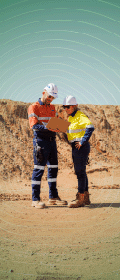In the UK, a ground breaking research project involving Plymouth Marine Laboratory (PML) scientists and universities in the GW4 Alliance aims to clean up water from a closed Cornish tin mine, Wheal Jane, using algae to harvest the precious heavy metals and produce biofuel at the same time. PML, in collaboration with researchers from all four universities in GW4 (the South West Research Alliance that brings together four leading, research-intensive universities: Bath, Bristol, Cardiff and Exeter), are now working with the Coal Authority and Veolia to take untreated mine water samples from Wheal Jane mine into the laboratory and grow algae in them. The research will explore whether algae is effective in removing materials such as arsenic and cadmium from the mine water.
Researchers will then look to convert the algae into a solid from which it’s expected that precious heavy metals can be extracted and recycled for use in the electronics industry. The remaining solid waste will then be used to make biofuels.
Wheal Jane, near Truro in Cornwall, closed in 1992. The Department of Environment, Food and Rural Affairs (Defra) has since that time funded the active mine water treatment scheme to protect the River Fal from pollution. This scheme is managed by the Coal Authority and operated by Veolia.
Dr Chris Chuck, Whorrod Research Fellow from the University of Bath’s Centre for Sustainable Chemical Technologies, said: “It’s a win-win solution to a significant environmental problem. We’re putting contaminated water in and taking out valuable metals, clean water and producing fuel. This technology could be applied to any type of mine or could even be used to clean up industrial effluent in the future.”
PML Microbial Biochemist Dr Mike Allen said: “Acidic waste run off from mines is not a regional issue restricted to Cornwall, it’s a global problem. It’s a particular problem in the developing world where costly clean-up and remediation activities are ignored because of their high cost and low return. By making the clean-up process pay for itself, we can improve both the health and the environment of millions of people around the world.”
Dr Chris Bryan, Lecturer in Sustainable Mining and Minerals Resourcing at the University of Exeter’s Environment and Sustainability Institute/Camborne School of Mines, said: “By growing algae in mine water, which is currently expensive to remediate, we are providing an alternative economic model to traditional algal cultivation. The aim is to reduce the treatment costs while generating value at the same time from the algal biomass.”









